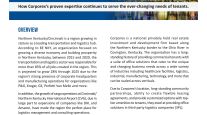Three Carriers Are Honored for Improving Driver Health
This story appears in the Jan. 27 print edition of Transport Topics.
Three truckload carriers recently won awards for helping drivers battle the widespread occurrence of obesity, diabetes and respiratory problems — even as a new report from the U.S. Centers for Disease Control and Prevention emphasized the poor state of health for most longhaul truck drivers.
Celadon Group, Con-way Truckload and Prime Inc. were recognized for their sustained efforts at improving driver health. The companies offer health and diet counseling and have built exercise facilities in order to retain drivers, keep them healthy and operating safely, and reduce insurance claims.
“We’ve been working on this for eight or nine years,” Celadon CEO Paul Will said. The Indianapolis-based carrier ranks No. 8 on the 2014 Healthiest Workplaces in America. “We want healthy employees to help us be successful, and we’re helping them to help themselves.”
Celadon was the only transportation company on this list selected by Healthiest Employers, a technology and data research company.
The CDC report found that nearly 70% of longhaul truck drivers are obese, 50% smoke cigarettes, 14% have diabetes and more than one-third have no health insurance. While it was useful for quantifying a distressing problem for the industry, it was not really a surprise.
The state of Washington produced a similar report on drivers in that state that was published in a CDC journal.
“They didn’t say anything I hadn’t heard or witnessed before,” said Bert Johnson, vice president of human resources for the Joplin, Mo.-based truckload division of Con-way Inc. His company won the Gold-Level Fit-Friendly Worksite Award from the 11-state Midwest affiliate of the American Heart Association.
“This has been on our radar screen for the past three to five years as health-care costs have skyrocketed,” Johnson said.
Smoking and excessive weight are consistently the top two health issues the company faces with drivers, he said.
Driver health and wellness ranked No. 10 on the 2013 annual survey of top industry concerns conducted by the American Transportation Research Institute.
The Owner-Operator Independent Drivers Association said it wants to see more cooperation between companies and drivers rather than government regulation.
“While these types of studies have pointed out that truckers have a tough mental and physical job, the answer is not more regulation, but instead an emphasis on wellness programs, education and support,” OOIDA spokeswoman Norita Taylor said. “We are open to working with any of the agencies in helping drivers.”
Prime Inc. President Robert Low made driver health a major focus of his 2012-2013 tenure as chairman of the Truckload Carriers Association. His firm has considered this a significant issue since 2000 and was named healthiest company because of its driver health and fitness program. The Springfield, Mo.-based carrier was selected by Everyday Health Media, a health information publisher.
While drivers are a critical component of any trucking company, it is particularly the case with truckload carriers that do not need to employ dockworkers. Will said Celadon has about 4,500 U.S. employees — 3,200 to 3,300 of them are drivers, or about 72%.
The three carriers are ranked on the Transport Topics Top 100 list of for-hire carriers with Con-way Inc. No. 3, Prime No. 21 and Celadon No. 44.
Over the weekend of Jan. 25, Celadon was due to open a new building to house the driving school it started in October 2012. Similar to a dormitory, there are more than 100 rooms, a cafeteria and a clinic, Will said. Clinic staff do physical examinations and drug screening and provide one-on-one health coaching. There also is a staff trainer to help with workout routines and physical rehabilitation after an injury.
All three companies said it is difficult to compel a driver to change his lifestyle if he does not want to, but increasingly drivers are coming to their employers for help.
Con-way’s Johnson said drivers use social media and blogs to talk to each other about their health problems and efforts to improve.
Siphiwe Baleka, Prime’s driver health and fitness coach, runs a voluntary 13-week program.
“Most drivers enroll because they’re scared, often after seeing a doctor,” he said, noting others are tired of the indignities they must often face.
“One guy got kicked off a ride at an amusement park because he couldn’t buckle his lap belt. Another got tired of having to buy two plane tickets when he flew,” Baleka said.
Truck stops also have been addressing driver health, said Tom Liutkus, a spokesman for TravelCenters of America and Petro Stopping Centers.
“Between horrible driver health statistics and efforts by fleets to turn a corner on this, we decided to come up with a way for our company to help,” Liutkus said, referring to the chain’s 4-year-old StayFit program.
TravelCenters and Petro have running and walking trails, basketball courts and indoor fitness centers. The restaurants also have more nutritious menu offerings.
“Meal options will always be the toughest. As with the population in general, most people will choose fried chicken over baked fish,” Liutkus said.


